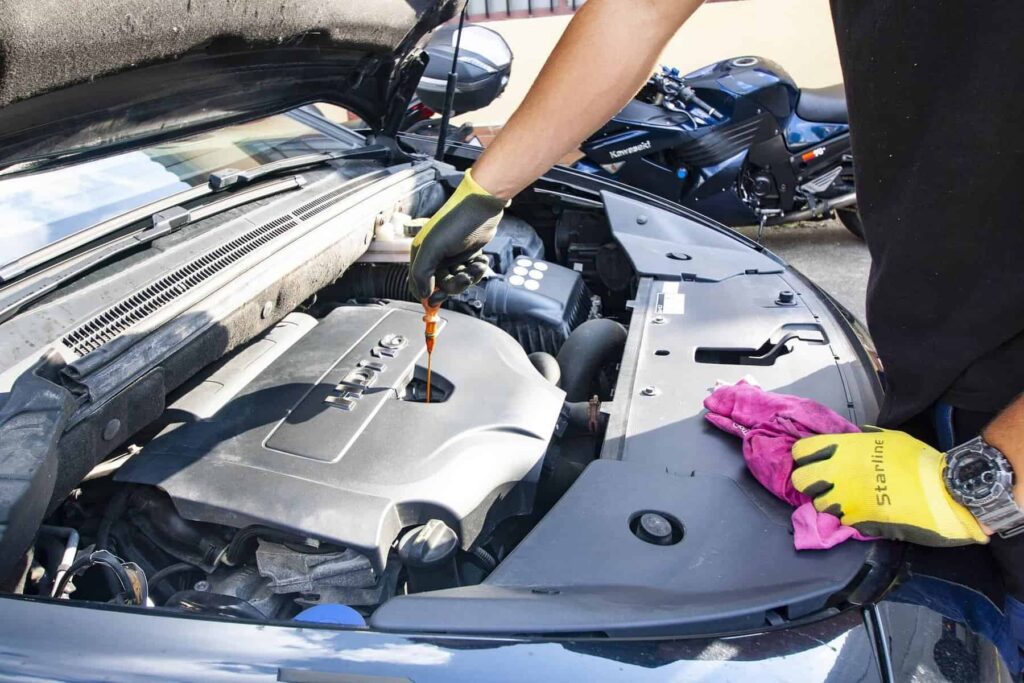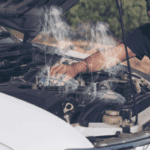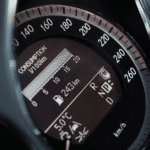You’ve got an overheating engine, and the oil light just came on. “Can low oil cause overheating?” will undoubtedly cross your mind.
To get straight into it before we go any further, yes, low oil can cause overheating. Engine oil’s job is to lubricate the engine components. Without oil to provide lubrication, you get friction, and friction means heat. Although your engine won’t melt, heat causes stress on engine components. It forces the cooling system into overdrive, trying to keep the temperature down, which can ultimately cause those parts, such as the water pump and thermostat, to fail quickly.
Although, as mentioned, low oil can cause overheating, it is rare. If you find the oil pressure light, low engine oil light, and the temperature gauge shooting up, you can say the cause will be low engine oil. However, if the engine oil is just a tiny bit low and the engine is overheating, the reason may be something else. I’ve covered all this in greater detail in this article.
How Does Low Oil Cause an Engine to Overheat?
Engine oil has two main jobs. Number one is to lubricate engine components to reduce friction between the components.
Number two is to cool moving parts. Engine oil cools moving parts by transferring the heat to the oil cooler, a much smaller radiator that allows flowing air to pass through as you drive, cooling and removing the heat from the oil.
If the engine oil is low, lubrication is not provided. Thus, there is friction between components. Friction produces heat. Then, because the oil is low, there is less fluid to move the heat around to be cooled. The engine’s little oil can’t keep up and never cools the engine sufficiently.
This is where an engine’s coolant system tries to help by removing the heat from the engine bay through coolant. However, this is designed to remove the heat when all components, including the oil working correctly, so when one-half of the engine is not doing its job, the coolant system goes into overdrive, trying to pick up the slack. It can’t cool the engine on its own.
What Are the Other Problems of Driving With Low Oil?
Overheating is one of many problems to look out for when driving low on oil, especially if you’ve potentially been driving for a long time with a low oil level. The other issues you will experience include:
- Engine rust and corrosion
- Engine bearing failure
- Dry seals split
- Scored engine components (damaged)
- Damage to components such as the turbo
- Rise in oil pressure causing overheating
Engine oil has qualities such as corrosion inhibitors added. When you drive low on oil and the engine overheats, all of the qualities in the oil get destroyed. It might surprise you to hear that something as simple as engine oil can write off an engine, leading to a hefty repair bill. Just topping up the oil will stop all these issues, so driving low on engine oil shouldn’t be a thing, but regular checking is needed to avoid such problems.
How Often Should You Check Engine Oil?
Engine oil should be checked monthly alongside coolant levels, brake fluid, tire pressures, and windshield washer fluid. However, quickly checking the oil level before you embark on a long journey is also a good idea.
How Long Can You Drive Low on Oil For?
Checking the oil level before considering if it is safe to drive would be the only way of determining how far or if you can drive. No oil on the dipstick will tell you that you shouldn’t even bother starting the engine it is too low, and more damage can or may already have been done.
However, if the level is still on the dipstick but not quite enough to reach the minimum marker, it would be okay to drive, but only a brief journey to an autopart store or garage for a top-up or replacement of oil.

Can Old Oil Cause Engine Oil to Overheat?
Old engine oil is no more likely to cause overheating than new oil. However, depending on what you call old oil depends on how ‘impure’ the oil is and how good it is at doing its job. Old engine oil oxidizes, which causes the engine oil to turn into sludge, just like driving with too much engine oil causes oxidization. You cannot do much to prevent oil oxidization, so it gets replaced at regular service intervals.
The only way old engine oil will cause the engine to overheat is if it has oxidized and is now sludge.
How Do You Check if Low Oil Is Causing a Problem?
Checking whether low oil is causing an issue is precisely as you would think: top up the oil level and get back in the car for another drive. If the fault remains, driving low on oil has caused permanent damage, or there is another fault. Taking your vehicle to a mechanic to inspect if the problem remains would be wise.
What Else Can Cause Overheating?
As I’ve already covered, the likelihood that driving low on oil is causing the engine to overheat is very slim. However, many other components in the engine bay will cause overheating but will also display other indicators. For one, the car may show the engine management light or go into limp mode when overheating. The other parts in an engine bay that can cause overheating are:
- Faulty water pump
- Blocked or damaged radiator core
- Blocked or damaged intercooler
- Cooling fan not operating or broken fan blades
- Broken serpentine belt
- Split water hoses
- Thermostat blocked or not opening
- Low coolant level
- Timing out
Frequently Asked Questions
Can Low Oil Cause Overheating While Idling?
If the engine is low on oil when idling, it may overheat after a while. However, if the overheating occurs immediately after starting the engine, it is unlikely to be caused by low oil unless the oil level is extremely low. In such cases, there may be another issue causing the overheating.
Can Adding Oil Fix Overheating?
If the car is low on oil and overheating, topping up the oil level is the first thing to do. If oil were the problem, it would sort out the overheating issue. However, further problems may arise if the engine damage is already apparent.
Can An Overdue Oil Change Cause Overheating?
The oil needs changing because the qualities in the oil deteriorate and no longer provide adequate lubrication(cooling) alongside other benefits. If the oil level is still correct, being overdue for an oil change will not cause overheating.
Can I Still Drive If My Cars Overheating Due To Low Oil Level?
It’s generally unsafe to continue driving your car if it’s overheating due to low oil levels. Low oil can cause the engine to overheat and potentially cause severe damage to your vehicle, including engine failure. It’s best to immediately pull over, turn off your car, check, and refill the oil before continuing.
Can Low Oil Level Damage The Engine Permanently?
Driving a car with dangerously low oil levels can leave permanent damage to the engine that can be costly to repair.
Summary
To summarise, driving low on engine oil can cause overheating, but the blame may be a fault with another part of the engine. Check the level to determine how low the oil is before you consider driving; if the oil level is dangerously low, don’t do it; you will regret it, especially if you end up on the back of a tow truck. Instead, top up the oil level and see if the overheating disappears; you can then be sure if the oil level was causing the issue.










Useful information. My engine overheats ant stops after a climb . My car is a Carib Toyotomka 1993.
Thanks for your comment. If your car is only overheating when it’s under load at low speeds, I recommend having a look at the coolant flow and cooling fan. You need to check if the coolant is circulating from the engine to the radiator and back. If so, is the radiator cooling fan operating? If all that checks out, it could be an electrical fault like the coolant temperature sensor but you’d need to get the car onto a diagnostic machine to be sure. Unless it is extremely low, I wouldn’t have thought you’d have an oil-related problem.
Regards
Tommy
carsneedcare.com